




 |
   |
 |
 |
7" (1974) **½/TTT Somos Livres Joaquim da Silva |
Current availability:
Mellotron used:
Ermelinda Duarte's Somos Livres (We Are Free), from 1974, is highly significant, as that was the year the country overthrew its fascist dictatorship, a year before neighbouring Spain followed suit. The song opens with a stately folkish melody, although, sadly, it soon slips into jaunty Mediterranean folk-by-numbers; however, I'm sure the message should be regarded as more important than the music. José Cid, then still of Quarteto 1111 (who were the band on the session), adds Mellotron strings throughout the track, sounding great on the intro and rather more cheesy later on. Good to hear them used, whatever. B-side Joaquim Da Silva isn't dissimilar, although Cid's Mellotron is further in the background.
Arnaldo Pata supplied me with these (thanks, Arnaldo!), although they're only available on crackly vinyl these days. You're not exactly going to find a copy of this easily and you probably wouldn't like it if you did, but despite its being very much of its time and place, it's interesting to hear Señor Cid use his Mellotron in a non-prog setting.
See: José Cid
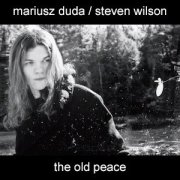 |
Download (2014) ****/TTT The Old Peace |
Current availability:
Mellotron used:
Alec Wildey was a young Porcupine Tree/Steven Wilson fan, involved with grassroots promotion, with (as Wilson says on his site) 'a very bright future ahead of him'. Tragically, still in his teens, Alec contracted cancer, which, as is often the way with young victims, aggressively attacked his system, ending his life at twenty-six. Upon learning that his condition was terminal, he asked Steven and Riverside's Mariusz Duda is they'd set one of his poems to music. Sadly, Alec didn't live to hear the result, The Old Peace, all proceeds from which are being donated to cancer research.
Duda's music is quite beautiful, a case study in how to write for acoustic guitar without falling into the usual clichés, while both men sing Alec's lyrics. Although, under the circumstances, it seems almost irrelevant, Mellotron use is what this site's about, so Wilson plays his M4000 on the track, with a vibes part, a flute melody, chordal strings and choirs towards the end of the piece.
See: Steven Wilson
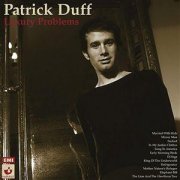 |
Luxury Problems (2005, 45.35) ***½/T |
|
| Married With Kids Mirror Man Fucked In My Junkie Clothes Song to America Early Morning Birds DJ Yoga King of the Underworld |
Refrigerator Mother Nature's Refugee Elephant Bill The Lion and the Hawthorn Tree |
|
Current availability:
Mellotron used:
Patrick Duff, once of Strangelove, is yet another entrant in the 'outsider musician' stakes, with years of global travel and international collaborations under his belt. 2005's Luxury Problems is his first solo album; imagine a modern British Dylan and you won't be a million miles off. Duff only actually sings on a handful of tracks, preferring a 'talking blues' style most of the time, top tracks including the angry howl of openers Married With Kids and Mirror Man, Song To America and the manic live take on Elephant Man, although you'd be hard-pushed to find any genuine duffers (sorry) here.
Weirdly, given that it's only audible on two tracks, no fewer than three people are credited with Mellotron, Mike Mooney, Damon Reece and Duff himself, with a seriously skronky string/flute line on Early Morning Birds and a wobbly flute solo on Mother Nature's Refugee, both sounding nicely real, for a change. Going by this album, Duff is a somewhat undersung talent, although his style certainly isn't for everyone, but then, mass acceptance inevitably means lowering one's standards to somewhere around zero, which clearly isn't going to happen in Duff's case.
Dukes of Stratosphear (UK) see: |
 |
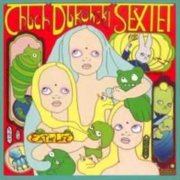 |
Eat My Life (2006, 35.59) **½/T |
|
| Eat My Life Xipe Totec Dreaming of the Endless Death Freedom? Night of the Hunter Atoms The Hammer Will Fall Venus in Furs |
My Blood Shines So Bright Just Like This The Day My World Fell Apart Leave All This Behind My War |
|
Current availability:
Mellotron used:
After leaving hardcore legends Black Flag in 1983, bassist Gary "Chuck Dukowski" McDaniel has gone on to play with a plethora of outfits, including The Chuck Dukowski Sextet, with his wife, Lora Norton. Their debut, 2006's Eat My Life, combines free jazz with hardcore sensibilities and the further reaches of psychedelic experimentation, the end result being something of an acquired taste. Sadly, I appear unable to acquire it, clearly being from the wrong musical background. Anything listenable? Possibly punky closer My War, although I won't pretend it's to my taste.
Red Hot Chili Peppers' Michael "Flea" Balzary plays Mellotron strings right through their take on The Velvet Underground's Venus In Furs, to passable effect, though hardly enough to make the effort worthwhile, unless their thing sounds like it might be yours.
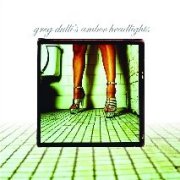 |
Amber Headlights (2005, 31.07) **½/TSo TightCigarettes Domani Early Today (and Later That Night) Golden Boy Black Swan Pussywillow Wicked Get the Wheel |
Current availability:
Mellotron used:
Greg Dulli (Afghan Whigs, Twilight Singers, Gutter Twins) is well known to us here, utilising Mellotrons on most of his work since the early '90s. Taking a break from The Twilight Singers, 2005's Amber Headlights was his first (and to date, only) solo studio album; sadly, I have to report that it's a bit of a disappointment. In my humble opinion, of course. It does all those Dulli things, but the bulk of it seems to glide past in a mid-paced kind of way, without ever really impinging itself on your consciousness, Wicked being an honourable exception.
It apparently took both Dulli and Mathias Schneeberger to play the Mellotron strings on Domani; admittedly, it does sound like two different machines, never mind different parts. Anyway, Dulli fans will undoubtedly already own this, while the rest of us can probably pass on by without worrying about it too much.
See: Afghan Whigs | Afterhours | Twilight Singers | Gutter Twins
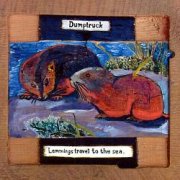 |
Lemmings Travel to the Sea [Disc 1] (2001, 42.24) ***½/T½Stars Grow ColderCurse Waste My Time Too Many Times Lemmings This Was a House Security Faithless Water for Tears |
Current availability:
Mellotron used:
Originally the duo of Seth Tiven and Kirk Swan, Dumptruck (Spike Priggen was an ancillary member) lasted in this form from 1983 to '91, splitting after a spectacularly mean-spirited and doomed-to-failure lawsuit from their record company. Since the split, Tiven has released two albums under the name, the second of which, 2001's Lemmings Travel to the Sea (note: a myth, as I'm sure he knows) is a double-disc set, disc one consisting of new studio recordings, while disc two archives life performances from 1986 and '88, effectively irrelevant to this site's remit. The studio disc's excellent, Neil Young-influenced Americana holds its own against any current practitioner of the genre you might care to name, highlights including opener Stars Grow Colder, Waste My Time, the brief, experimental Lemmings and stately, twelve-minute closer Water For Tears.
Alice Spencer plays Mellotron, with clearly genuine flute, cello and string parts on Too Many Times (listen for the flute stabs at around the two-minute mark), making for a proper Mellotron mini-classic, actually gaining the album (OK, pedant, the disc) a rare star-and-a-half for a single track. Going by disc two's original lineup live material, Dumptruck fans of old shouldn't be disappointed by Lemmings..., while Americana fans who might be unaware of their existence could do worse than to give this a go. Recommended.
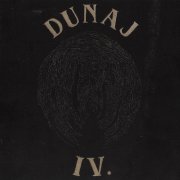 |
Dunaj IV (1994, 45.36) ***½/T |
|
| Po Ztezkách Srdce Už Dávno Není Barvy My Steps Watchtower Any Sight In the Flash It's Near Right |
The Solitary Bird Kobylky Stojím Popel a Dým Whisper Sometimes Venus |
|
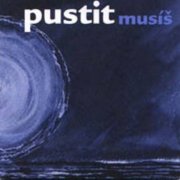 |
Pustit Musíš [as Iva Bittová & Pavel Fajt] (1996, 54.35) ***½/T½ |
|
| Ouvertura Pavouk Zrcadlový Sál Pustit Musíš V Bílém Bumerang Kaše Nedĕlej, Nedĕlej |
Muriel Cassiniho Dĕlení Dunaj Nekňuba Divoká Svinĕ Rukama V Černém Mrtvý Joe |
|
Current availability:
Mellotrons used:
Iva Bittová's Dunaj seem to have a decent public profile in their native Czech Republic, although they mean diddly-squat anywhere else, as is so often the way with local heroes. They had a pretty ragged history, lineups coalescing, splitting and re-coalescing and albums being recorded with various combinations of musicians. Bittová (vocals) and Pavel Fajt (drums) appear to've been the main members, although they left an early version of the band, reforming their best lineup to recorded 1989's Dunaj a Bittová. However, Bittová subsequently left, rejoining for their third effort, '93's Dudlay, which sounds an awful lot like locals' pronunciation of Dudley in the Birmingham conurbation. With me so far?
Anyway, going by 1994's Dunaj IV, they played a kind of awkward, progressive hard rock, '80s Crimson influences never far from the surface, typified by Už Dávno Není or Sometimes, contrasting sharply with the acoustic Popel A Dým, although their version of Dutch pop outfit Shocking Blue's Venus is a bit pointless. Attempt at a hit single, anyone? Volkmar Miedtke (Dark Star, Klar) plays Mellotron on two tracks, with a floating string line on Any Sight and a skronky flute line with shrieking strings on It's Near Right. It sounds a bit ropey, but it seems rather unlikely that Mellotron samples had reached that part of the world in '94, although who knows?
Just to confuse matters, their follow-up, '96's Pustit Musíš, was officially released under the name Iva Bittová & Pavel Fajt, although I've also seen it listed under its title and, of course, Dunaj. It seems easier to leave it here, anyway. It's not dissimilar to its predecessor, although Jiří Kolšovský's vocals put a different emphasis on things, though not enough to change their overall sound. Two Mellotron tracks from Miedtke again, with block string chords on opener Ouvertura and very upfront ones on Kaše, making the latter the nearest the band ever got to a Mellotron track'. Sadly, Jiří Kolšovský died in the late '90s, although all other members are still musically active.
 |
Pelo Sabor do Gesto (2009, 46.26) ***/T |
|
| Boas Razões Todos os Verbos Telhados de Paris Tudo Sobre Você Sinto Encanto Pelo Sabor do Gesto Ambiçâo |
Esporte Fino Confortável Os Dentes Brancos do Mundo Se Eu Fosse Aberto Se Um Dia Me Quiseres Duas Namoradas Nem Tudo |
|
Current availability:
Mellotron used:
Zélia Duncan's been around since the early '80s, but doesn't seem to mean a lot outside her home territory. 2009's Pelo Sabor do Gesto is very much a Brazilian pop record, at its most typical on the likes of opener Boas Razões, Tudo Sobre Você and Esporte Fino Confortável, while Ambiçâo and the jazzy Se Eu Fosse step outside the box a little.
Graig Markel plays Mellotron, with surprisingly genuine-sounding choppy flutes on Duas Namoradas, key-click and all. Hardly a reason to buy this, but nice to hear a relatively recent album that doesn't just slap on the old samples.
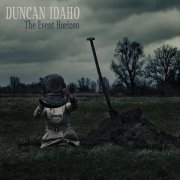 |
The Event Horizon (2012, 42.06) ***/TTT½ |
|
| A Life for Every Sleeper Extrapolate Vulture of July Io The Event Horizon Last Miss Vaporizing Waterfalls Spiraling Bridges |
The False Light Echolocation 4-7 |
|
Current availability:
Mellotron used:
On Event Horizon, Duncan Idaho (named for the character from Dune) play that rarest of things, halfway decent indie. It undeniably falls into the genre, while simultaneously rising above it, by writing memorable songs that utilise more than two chords and one rhythm. Surely that elevates it out of indie altogether, then? Their trick (I finally worked out) is to incorporate ideas from elsewhere: psychedelia, avant-rock, prog even, particularly on Vaporizing Waterfalls and eight-minute closer Echolocation 4-7. You know, just like proper bands.
Ruud Peeters plays his M400 on the album, with choppy choirs on Extrapolate, strings and upfront flutes on Vulture Of July, cellos and wonderfully upfront strings on the title track, strings on Spiraling Bridges and flutes and volume-pedalled strings on The False Light. Much better than expected, plenty of very real Mellotron.
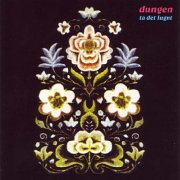 |
Ta det Lugnt (2004, 53.25) ****/T½ |
|
| Panda Gjort Bort Sig Festival Du e fö Fin fö Mig Ta det Lugnt Det du Tänker Idag är du i Morgon Lejonet & Kulan Bortglömd |
Glömd Konst Kommer Stundom Ånyo Till Heders Lipsill Om du Vore en Vakthund Tack Ska Ni Ha Sluta Följa Efter |
|
Current availability:
Mellotron used:
Dungen (pronounced 'doon-yen', not phonetically, or worst of all, 'dungeon') are the brainchild of a young Swedish multi-instrumentalist, Gustav Ejstes, around whom a band eventually coalesced, including no less a personage than guitarist Reine Fiske, ex-Landberk and Paatos. Having just seen the band play a blinding gig in a London club, I can attest that they can cut it live: what about on album?
Ta det Lugnt is technically their third release, although only their second CD (followed by a compilation of early EPs, Dungen 1999-2001), a cool-as-fuck mixture of psych and prog, which begs the question: why are they fashionable? I ask the same question about Australia's super-retro Wolfmother and the only (patronising) answer I can come up with is: expose enough people to good, underground music and some of them will catch on, unaware of the band's forebears. Ta det Lugnt by and large captures the band's live sound, right down to Fiske's guitar torture, particularly on Du E Fö Fin Fö Mig. Did I say that Ejstes sings in Swedish? Nothing if not uncompromising... He hauls a Hammond and a Wurly around, too, rather than make do with the standard substitutes. Christ, you can tell the difference... Listen to the churchy tones on Lejonet & Kulan for proof. Basically, there isn't a bad track here, from the more (relatively) straightforward stuff to the brain-frying psych workouts. Closer Sluta Följa Efter is essentially Landberk at their most freakout, complete with ripping (and clearly real) Mellotron strings. Landberk's old machine? Who knows? Glömd Konst Kommer... is the other Mellotron track present, being no more or less than a flute solo, complete with tape wobble part of the way through.
See: Samples etc. | Landberk | Paatos
 |
Time to Fly (1999, 47.43) **½/T½ |
|
| Crowdsurfing Time to Fly I Get High Hollywood Personal Assistant Santa Fe You Got it Just Felt Right |
Everything is Blue Take You There Airwaves Running Crowdsurfing (Surf's Up mix) |
|
Current availability:
Chamberlin used:
Wikipedia describes Ontarians Dunk as 'powerpop', but, on their second album, 1999's Time to Fly (they released their debut under the name Starkicker), they're more an alt. outfit who can't quite decide which style to play, so they do them all. As in? Opener Crowdsurfing's awful drum sound does its best to scupper a great song, the title track is combo organ-driven freakbeat with (again) awful drums, I Get High is '90s indie-with-programmed-beats, Take You There is crappy '90s pop/rock... Other better tracks include the actual powerpop of Personal Assistant and Just Felt Right, but, while I feel I should applaud diversity, Dunk take the concept a little too far.
The Wallflowers' Rami Jaffee plays his Chamberlin (model unknown), with chordal strings on I Get High, background ones on Personal Assistant and a great cello/flute interlude on Just Felt Right. Dunk called it a day after this, which may've denied us a few more powerpop minor classics, but probably actually spared us several albums'-worth of landfill indie.
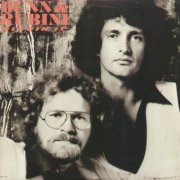 |
Diggin' it (1976, 32.55) **½/T |
|
| Diggin' it Imaginary Girl Love is Blind Two Words Could Never Say I'm Blue Back From the Fire Just Keep Laughin' |
You Gotta Give it to Me Turn on the Radio You Gotta Give it to Me (reprise) |
|
Current availability:
Chamberlin used:
I've been after a copy of this ever since I found the LP cheap some years ago, bought it and got it home, only to find that the contents were something else entirely. I got my money back, but I've been looking for it ever since. Was it worth the wait? Not really, no... Dunn & Rubini were Don (not Donald "Duck") Dunn and Michel Rubini, both professional writers and sessioneers, whose sole LP, 1976's Diggin' it, is pretty much what you'd expect of both the era and their musical circle; no, not fusion, but a soul/pop/rock hybrid that hasn't aged especially well. They were supported by a cast of thousands, including no fewer than ten different guitarists, among them Jesse Ed Davis, Lee Ritenour and Stray Dog's Waddy Wachtel, plus vocalists Seals & Crofts and Thelma Houston, although I can't really say that their presence really livens things up any. Best track? Probably the Back From The Fire/Just Keep Laughin' one/two, with a ripping guitar solo (Wachtel?) and the latter's Stonesy vibe.
Rubini plays Chamberlin, amongst other keys, with flutes on Imaginary Girl and strings on Love Is Blind, although all other string parts sound real. Well, I've heard it at last. Consummately written, played and produced, but it sounds like the kind of stuff you can hear on the soundtrack of footage of New York from the mid-'70s. Take that as you will.
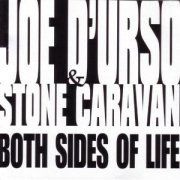 |
Both Sides of Life (2003, 79.23) ***/T |
||
| So Tired Freezing Dreams Let it Go Vagabond Moon Your Eyes Badlands Happy Song Funny What This World Can Do |
Air She's Leaving Home School Days American World Be She Cries Early June As the Rain Falls in Dublin |
Walk on Missing Six Months in Italy Pretty Soon Hey Annie Falling Power of the Dove |
|
Current availability:
Mellotron used:
Joe d'Urso and his band, Stone Caravan, play a kind of Springsteenish Americana, purpose-built for America's FM stations, where good old-fashioned rock'n'roll can still be heard. It seems blue-collar rock will never go out of fashion in the States; something to do with the sheer size of the place seems to encourage a conservatism of a kind almost unknown in Europe, including musically. Saying that, there's nothing wrong with d'Urso's work, although you wouldn't exactly call it 'forward-looking'; I think the term 'traditional' could be applied here. In spades. His seventh album, 2003's double-disc Both Sides of Life, is almost certainly typical of his oeuvre, mixing Tom Petty-style rockers (occasionally almost straying into Bob Seger territory) with acoustic ballads, particularly on the second disc. Er, thus the title? Highlights? The rocking Happy Song and Air. No actively bad material, although the rhyme-and-scansion-free Six Months In Italy is a little odd, while much of the second disc is too slushy for its own good.
Michael Mazzarella plays Mellotron, with strings and flutes on Be and flutes on Hey Annie, sounding real enough, which is what I'd hope for from someone this old-school. Is your collar blue? Do you drive a truck? Sorry, getting carried away there... D'Urso plays proper heartland rock as it was, is and always shall be. Non-Americans may not get this - I know I don't - but it does what it does superbly and is difficult to knock. He's also one of the 'good guys', sitting on the boards of several right-on organisations, although that isn't actually a reason to buy his albums. So; good at what it does, but not much Mellotron.
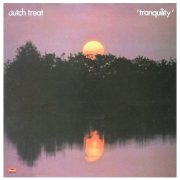 |
Tranquility (1977, 38.34) ***/TSans ParapluieLa Escala Transistoriness First Bird to Awake. First Bird to Sing En Vitesse Stereoscope San Sebastian Unexpected Tidings Dew is Falling |
Current availability:
Mellotron used:
Dutch Treat were a one-off, comprising Nederlander session players, including members of Ekseption and Third Eye. Their lone album, 1977's Tranquility, does what it says on the tin, being a laid-back, jazzy instrumental set, wildly (and clearly deliberately) out of touch with the times, possibly at its best on Transistoriness, First Bird To Awake. First Bird To Sing and closer Dew Is Falling, complete with ultra-melodic guitar solo.
Jan Huydts plays Mellotron, with occasional flutes on La Escala, a flute line on Unexpected Tidings, sounding remarkably authentic, and a brief chordal flute part on Dew Is Falling. Unsurprisingly, Tranquility never sold well in the first place, but increasing demand has led to 678 Records' 2024 LP and CD reissue.
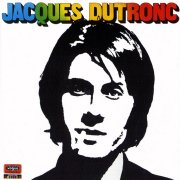 |
Jacques Dutronc [a.k.a. Le Responsable, a.k.a. L'Aventurier] (1969, 33.25) **½/TT |
|
| Le Responsable L'Idole (Je N'en Peux Plus) L'Amour est le Moteur du Monde La Maison des Rêves Quand C'est Usé on le Jette Les Petites Annonces Où est-il l'Ami Pierrot? L'Aventurier |
Laquelle des Deux est la Plus Snob Les Femmes des Autres La Paresse L'Hôtesse de l'Air |
|
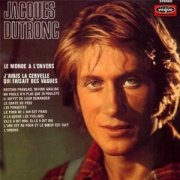 |
Jacques Dutronc [a.k.a. L'Arsène] (1971, 34.36) ***/TTT |
|
| L'Arsène Restons Français Soyons Gaulois Ma Poule N'a Plus Que 29 Poulets Il Suffit de Leur Demander Le Conte de Fées Les Parasites Le Monde à l'Envers Le Fond de l'Air est Frais |
À la Queue les Yvelines Elle a Dit Non, Elle a Dit Oui L'âne est au Four et le Boeuf est Cuit J'Avais la Cervelle Qui Faisait des Vagues |
|
Current availability:
Mellotrons used:
French singer/actor Jacques Dutronc wrote songs for Françoise Hardy (they later married) in the '60s, before embarking on a solo career. There seems to be much dispute over the titles of his first several albums: Discogs lists them ALL as self-titled (beat that, Peter Gabriel), Wikipedia gives them completely different titles, while their actual sleeves vary depending on the issue. Confused? Good. 1969's Le Responsable (or L'Aventurier, or simply Jacques Dutronc) is no more or less than a fairly typical late '60s French pop LP, quite a mixed bag, veering between upbeat opener Le Responsable, the dark L'Idole (Je N'En Peux Plus), the balladic Est-Il L'Ami Pierrot? and appalling closer, the oompah/yodelling crossover L'Hôtesse De L'Air, plus a couple of rather cheesy film theme songs, La Maison Des Rêves and Quand C'est Usé On Le Jette, both from Pierre et Paul. An unknown sessioneer plays Mellotron M300, with strings all over L'Amour Est Le Moteur Du Monde, strings and clarinet on Où Est-Il L'Ami Pierrot?, strings on La Paresse and closer L'Hôtesse De L'Air, generally doing a fine job of fooling the ear into thinking they're real.
1971 brought the more contemporary L'Arsène (or Jacques Dutronc 71, or, again, Jacques Dutronc), better efforts including Restons Français Soyons Gaulois, the Hammond-heavy Ma Poule N'A Plus Que 29 Poulets, Le Monde À L'Envers and À La Queue Les Yvelines. That M300 gets a real battering this time round, with strings on L'Arsène, flutes and strings on Restons Français Soyons Gaulois, cellos and strings on Il Suffit De Leur Demander, upfront, clicky clarinets on Le Conte De Fées, clarinet on Le Fond De L'Air Est Frais, strings and cellos on Elle A Dit Non, Elle A Dit Oui, cello and a beautiful flute part on L'Âne Est Au Four Et Le Boeuf Est Cuit and strings on cheesy closer J'Avais La Cervelle Qui Faisait Des Vagues.
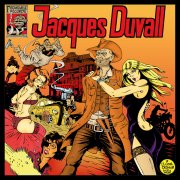 |
Le Cowboy et la Call-Girl (2009, 38.40) ***/½ |
|
| Le Cri Chanson Malade Marianne Renoir Marquise Raconte-Moi La Poupée Borgne Ougrée Ta Main, pt. 2 |
Le Cowboy et la Call Girl Sept Bonnes Raisons |
|
Current availability:
Mellotron used:
Eric "Jacques Duvall" Verwilghen seems to be better known as a lyricist than as a musician, so, although his first published lyric dates back to 1977 (for The Runaways, as it happens), 2009's Le Cowboy et la Call-Girl (in collaboration with Belgian garage specialists Phantom's Benjamin Schoos) is only his third release since his 2006 'comeback'. It's like a more polite version of, say, The Cramps, rockabilly slowed to a funereal pace, at its best on opener Le Cri, Ta Main, Pt. 2 and acoustic closer Sept Bonnes Raisons.
Kramer adds a touch of Mellotron to the proceedings, if only just, with a brief, echoed-to-hell flute part at the end of closer Sept Bonnes Raisons. Very faux-'50s, very Gallic. As a footnote, I see that Brian Carney, once of the mighty Poisoned Electrick Head, plays his Jupiter-8 on the album.
 |
Boxes (2007, 33.39) ***/TT |
|
| Boxes As the Snow Slow Breaking Save You Sweetest Days River of Love My Home |
Changing Everything Rise |
|
Current availability:
Chamberlin used:
Sally Dworsky might be best-known for providing singing voices for several high-profile animated characters, not least someone in The Lion King (I don't know, do you think I watch this crap?), although she's recorded with a couple of bands, not least Uma and released a solo album, 2007's Boxes. While, in many ways, it's a pretty standard female singer-songwriter-with-a-touch-of-country record, Dworsky's songs elevate it above the usual, at their best on the opening title track and the countryish Breaking.
Patrick Warren plays Chamberlin, with distinctly Chambyesque strings on Slow, Save You and Changing Everything and strings and flutes on Sweetest Days. I've heard more dynamic albums of this type, but then, I've heard vastly worse, too.
See: Uma
 |
Anthology: Part One (2015, recorded 1964-1982, 55.57) ***½/T |
||
| Judy & the Folkmen: Come All Ye Fair and Tender Ladies (home recording) Spanish is a Lovin' Tongue (home recording) Judy Dyble: Improvisation (with Richard Thompson) Fairport Convention: Both Sides Now (unreleased demo) One Sure Thing (unreleased demo) |
Giles, Giles & Fripp: Make it Today Passages of Time Under the Sky Murder Mouseproof with G.F. Fitzgerald: May Four |
Judy Dyble: Better Side of Me (unreleased 1972 demo) I Hear a Song (unreleased 1973 demo) Satisfied Mind (1974 cassingle) See Emily Play (unreleased 1982 demo) Mirror Master Tape Advertisement (1982 demo) |
|
Current availability:
Mellotron used:
Judy Dyble (1949-2020) was, of course, Fairport Convention's first female vocalist, singing on their self-titled debut, before moving on to an embryonic version of Giles, Giles & Fripp before forming Trader Horne, legendarily named after John Peel's children's nanny (!), Florence "Trader" Horn. She largely retired from music after 1973, occasional Fairport guest spots notwithstanding, only picking up again in the early 2000s. 2015 brought a three-CD set, Gathering the Threads (Fifty Years of Stuff); its first disc (The Early Years) was, for some reason, issued as a standalone album, Anthology: Part One. It would be fair to say it's a mixed bag, highlights including two previously-unreleased Fairport demos, four songs from Giles, Giles & Fripp's The Brondesbury Tapes and an alleged cassingle (remember them?) from 1974 of Porter Wagoner's Satisfied Mind, while it's good to hear her early work with Judy & the Folkmen. Allow me to point out, however, that twelve minutes of Judy and Richard Thompson jamming on dual recorders is possibly twelve minutes too much.
Mellotron? Someone adds a flute melody and chordal choirs to 1982's Mirror Master Tape Advertisement (a long-forgotten tape manufacturer), a reworking of Amazing Grace. Given that the set's previous track, a rather ropey '82 recording of Pink Floyd's See Emily Play is a collaboration with Mellotron owner Adrian Wagner, not to mention that he's mentioned in the ad's voiceover, might it be him? Anyway, few previously-unheard classics, but a decent listen.
See: Samples etc. | Fairport Convention | Giles, Giles & Fripp | G.F. Fitz-Gerald
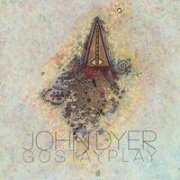 |
Gostayplay (2004, 44.02) ***/T |
|
| Airtime Moving Fast Nick (Song for Nick Drake) Shybreeze Ocean of You Surely it'll Shine Through Two Can Play Too Center to Hold |
Hot Owl Accord Gostayplay |
|
Current availability:
Mellotron used:
A chance reacquaintance with Johnny Society's Kenny Siegal in a New York club set John Dyer on the road to making 2004's Gostayplay, a cool-end-of-pop/rock-singer-songwriter album, at its best on Moving Fast's cool '60s vibe and the mildly deranged Surely It'll Shine Through.
Co-producer Siegal (also of Blueberry) plays Old Soul Studios' M400 (also used by Ratatat), with strings on Nick (Song For Nick Drake). Shame he didn't use it more, as I so often say. A decent album, then, if no classic.
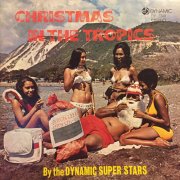 |
Christmas in the Tropics (1973, 28.51) **½/TTT½ |
||
| BL & D: White Christmas Vic Taylor: Pretty Paper BL & D: Winter Wonderland Boris Gardiner: The Meaning of Christmas S.P.M.: Silent Night |
Toots & the Maytals: Happy Christmas Keith Lyn: Blue Christmas BL & D: Santa Claus is Coming to Town Barry Biggs: I Saw Mommy Kissing Santa Claus S.P.M.: Auld Lang Syne |
||
Current availability:
Mellotron used:
The Dynamic Super Stars appear to've been a group of musicians involved with Jamaica's Dynamic Sounds Studios, making this a semi-compilation, although it seems likely the backing tracks were all recorded by the same set of studio players. It's all pretty much as you'd expect: seasonal favourites played in a reggae style, featuring various vocalists, not least Boris Gardiner and Toots Hibbert. Highlights? Er, not as such, although BL & D's (Byron Lee & the Dragonaires) White Christmas is a spirited take on the number.
The Mellotron was almost certainly played by Neville Hinds, with strings all over Vic Taylor's maudlin Pretty Paper, Boris Gardiner's The Meaning Of Christmas, Toots & the Maytals' Happy Christmas, Keith Lyn's Blue Christmas and Barry Biggs' I Saw Mommy Kissing Santa Claus, piping flutes on BL & D's Winter Wonderland and strings and upfront flutes on BL & D's Santa Claus Is Coming To Town. I'm not sure working your way through even this brief selection of Christmas reggae efforts is worth it for the Mellotron, but it's out there if you just can't get enough.
See: Byron Lee & the Dragonaires
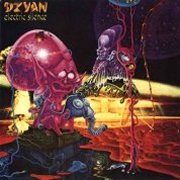 |
Electric Silence (1974, 37.05) ***½/TTBack to Where We Come FromA Day in My Life The Road Not Taken Khali For Earthly Thinking Electric Silence |
Current availability:
Mellotron used:
Dzyan were named for The Stanzas of Dzyan, a supposed ancient Tibetan text, quite possibly forged in the late 19th Century by Russian mystic and Theosophist H.P. Blavatsky. Their third and last release, Electric Silence, is a bonkers, stoned-out Krautrock album, a considerable Eastern influence evident on several tracks. Eddy Marron's sitar and tambura playing are added to the ethnic pot-pourri, along with more standard rock and folk instrumentation, although the title track is pretty much the only one to stick to the standard electric guitar/bass/drums format. Difficult to isolate highlights when you're not really into the style, but if you go for that trippy, Eastern thing, you could do a lot worse.
The 'Mellotrone' (why?!) was played by both Marron and bassist Reinhard Karwatky, although side one of the original album seems to be Mellotron-free. Khali, on the other hand, has more Mellotron choir than you could shake a stick at, quite possibly being both players improvising on two machines, though that's a complete guess. There are a few flute chords on For Earthly Thinking, although that's it on the Mellotron front. So; if you like that Krautrock thing, you'll be well away here, although fans of more standard prog should probably steer clear. One full-on Mellotron track, so the decision's yours.